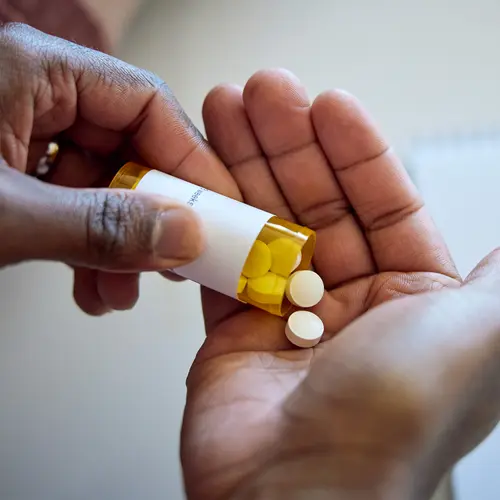On any given day, some 2 million people are imprisoned in America. Many of them have a serious mental illness, like schizophrenia or bipolar disorder.
Mental illness is so common in prisons that these places are sometimes called "the new asylums." Ten times more people with severe mental illness are in prisons than in state mental hospitals.
People with schizophrenia get stuck in the prison system. While there, they become prey to abuse and violence. And they often don't get the treatment they need to manage their psychotic symptoms and break the prison cycle.
How Common Is Mental Illness in Prison?
About 1 in 7 prison inmates and 1 in 4 people in jails have a serious mental illness. Up to 4 percent have schizophrenia.
The rate of severe mental illness is three to four times higher in the criminal justice system than outside of it. Some prisons, including the Los Angeles County Jail and New York's Rikers Island, house more mentally ill people than any of the country's psychiatric hospitals.
Why Do People With Schizophrenia End Up in Prison?
Two hundred years ago, people with serious mental illness were placed in prisons or asylums because society didn't know how to care for them. After reformers fought for more humane treatment for the mentally ill, their care moved to mental institutions in the 1800s and early 1900s.
By the 1960s, new medications called antipsychotic drugs were available to control the symptoms of schizophrenia. States started to close their mental institutions, believing that people would do better if they were treated in community mental health programs instead of hospitals.
But because community programs lacked the funding they needed, the pendulum swung back the other way by the late 20th century. More people with mental illness ended up in prison.
Despite the high number of mentally ill people in prison, most people with schizophrenia never commit a violent crime. One study found that the most common offenses committed by the mentally ill were related to drugs and alcohol, followed by theft. And when people with schizophrenia do commit violent crimes, they're often under the influence of drugs or alcohol.
What Happens to People With Schizophrenia in Prison?
People with mental illnesses are already at a disadvantage when they enter prison. They're more likely to have experienced poverty, homelessness, a broken family, and substance misuse. Being in prison makes them vulnerable to even more abuse.
Prison is harder for people with schizophrenia. They get into trouble more often because they can't understand the rules or follow them. They're also more likely to hurt themselves or hurt others than other members of the prison population.
Those who don't follow the rules can end up in solitary confinement. Alone in that small space, they become even more distressed, have more psychotic symptoms, and are more likely to attempt suicide.
Suicide is already the leading cause of death in prisons. It accounts for nearly 1 in 3 prison deaths. The risk of suicide is seven times higher in people with schizophrenia than in those without it. And the number of mentally ill people who think about or attempt suicide is even higher.
Stuck in the System
People with schizophrenia get stuck in the prison system. Their prison stays are much longer, on average, than people without mental illness. At Riker's Island, the average stay is 42 days. Inmates with mental illness stay an average of 215 days. One reason is that they have to wait for the courts to decide whether they are competent enough to stand trial.
Prison becomes a revolving door for many people with mental illness. Once released from prison, they get into trouble with the law again and end up right back there, which is called recidivism. One in 4 mentally ill people has been in prison three or more times, compared to 1 in 5 people without mental illness.
Being in prison leaves lasting marks. The stigma of mental illness, incarceration, and drug/alcohol misuse makes it hard to find a job. A criminal record also prevents people from getting government assistance, including affordable Section 8 housing.
How Is Schizophrenia Treated in Prison?
Prisons were designed to punish and deter people who've committed crimes. They weren't set up to provide mental health services. The prison system often does a poor job of managing severe mental illnesses like schizophrenia.
When mental illness goes untreated, it only gets worse. People who don't take the medication they need are more likely to become violent.
Sometimes people in prisons get treated but with the wrong medication. The antipsychotic medicines used to treat schizophrenia don't work about 30 percent of the time.
Clozapine is the only antipsychotic that's been proven to work on treatment-resistant schizophrenia. Clozapine also helps to reduce aggressive and impulsive behaviors and prevent people with schizophrenia from hurting themselves.
Although clozapine is effective, one-third of states don't offer it to their prison inmates. One reason is that people who take clozapine need to be carefully monitored for side effects, which takes a lot of effort.
What Can Be Done?
People with mental illness have the same legal right to treatment as people with any other chronic medical condition, both in and out of prison. The Americans with Disabilities Act (ADA) requires prisons to provide effective treatments to inmates with any chronic medical condition, whether it's hepatitis C, diabetes, or schizophrenia.
Screening people for mental illness when they arrive in prison and starting them on treatment right away can help prevent mentally ill people from getting stuck in the criminal justice system. Quick treatment with antipsychotic medication also prevents violence and other types of behaviors that land people with schizophrenia in prison and keep them there.
There are benefits to getting people with severe mental illness out of the prison system. Community-based treatment programs offer better outcomes. Studies find these programs have lower rates of recidivism compared to prisons.

